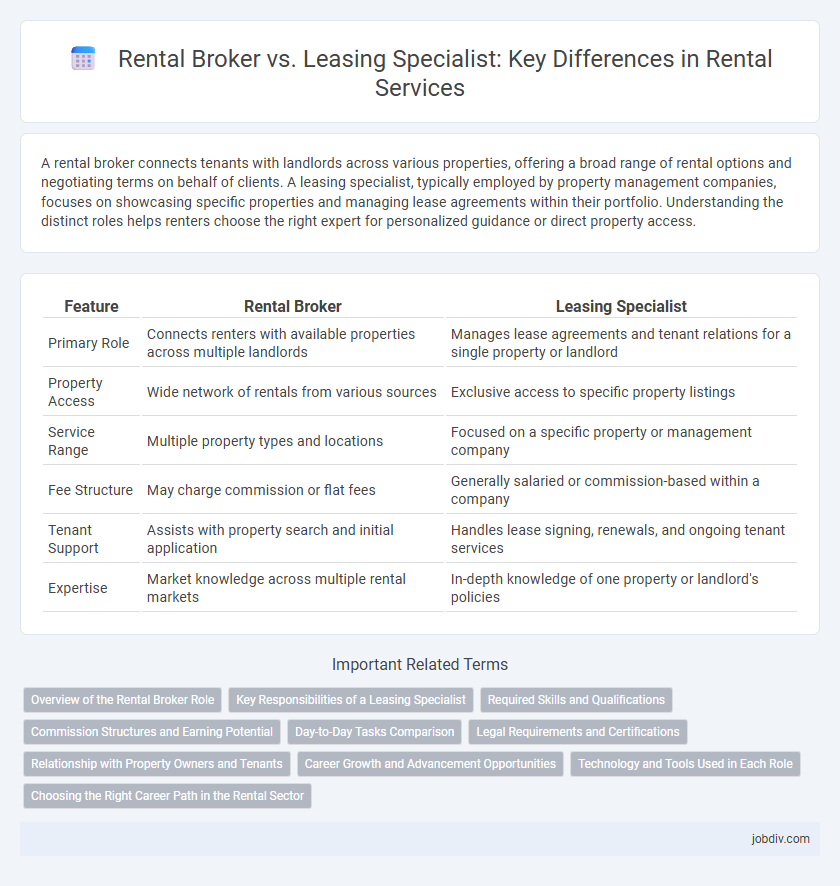A rental broker connects tenants with landlords across various properties, offering a broad range of rental options and negotiating terms on behalf of clients. A leasing specialist, typically employed by property management companies, focuses on showcasing specific properties and managing lease agreements within their portfolio. Understanding the distinct roles helps renters choose the right expert for personalized guidance or direct property access.
Table of Comparison
| Feature | Rental Broker | Leasing Specialist |
|---|---|---|
| Primary Role | Connects renters with available properties across multiple landlords | Manages lease agreements and tenant relations for a single property or landlord |
| Property Access | Wide network of rentals from various sources | Exclusive access to specific property listings |
| Service Range | Multiple property types and locations | Focused on a specific property or management company |
| Fee Structure | May charge commission or flat fees | Generally salaried or commission-based within a company |
| Tenant Support | Assists with property search and initial application | Handles lease signing, renewals, and ongoing tenant services |
| Expertise | Market knowledge across multiple rental markets | In-depth knowledge of one property or landlord's policies |
Overview of the Rental Broker Role
Rental brokers facilitate property transactions by connecting landlords and tenants, efficiently managing rental listings and negotiations. They possess in-depth knowledge of local market trends, legal regulations, and price valuations to maximize client satisfaction. Their role emphasizes client relationship management, contract coordination, and ensuring compliance with rental laws.
Key Responsibilities of a Leasing Specialist
A leasing specialist is responsible for managing property showings, screening prospective tenants, and processing rental applications to ensure qualified and reliable occupants. They handle lease negotiations, coordinate move-in and move-out procedures, and maintain compliance with housing laws and company policies. Effective communication and customer service skills are essential for managing tenant relationships and resolving issues promptly.
Required Skills and Qualifications
Rental brokers require strong negotiation skills, comprehensive knowledge of market trends, and proficiency in client relationship management to effectively connect tenants with property owners. Leasing specialists must possess excellent communication abilities, attention to detail for managing lease agreements, and familiarity with local rental laws and property management software. Both roles demand customer service expertise and the ability to assess tenant eligibility to ensure smooth rental transactions.
Commission Structures and Earning Potential
Rental brokers typically earn commissions based on a percentage of the lease value, often ranging from 5% to 10%, which incentivizes them to close deals quickly and manage multiple properties. Leasing specialists usually receive a fixed salary supplemented by bonuses tied to lease signings or occupancy rates, offering more stable income but potentially lower earning spikes compared to brokers. Commission structures for brokers can lead to higher earning potential in high-demand markets, while leasing specialists benefit from consistent pay in more steady rental environments.
Day-to-Day Tasks Comparison
Rental brokers primarily manage property listings, coordinate showings, and negotiate rental agreements between landlords and tenants, ensuring a smooth transaction process. Leasing specialists focus on tenant screening, lease document preparation, and ongoing tenant relations, including handling maintenance requests and renewals. Both roles require strong communication skills but differ in their emphasis on client acquisition versus tenant management.
Legal Requirements and Certifications
Rental brokers must typically obtain a real estate broker's license, which requires passing state-administered exams and fulfilling continuing education mandates to comply with legal regulations. Leasing specialists are often required to have specific certifications related to property management, such as the Certified Leasing Specialist (CLS) credential, ensuring adherence to fair housing laws and leasing regulations. Both roles must maintain up-to-date knowledge of local landlord-tenant laws to legally execute rental agreements and protect client interests.
Relationship with Property Owners and Tenants
Rental brokers act as intermediaries between property owners and tenants, facilitating lease agreements by matching tenant needs with available properties. Leasing specialists maintain ongoing relationships with both parties, managing tenant screening, lease negotiations, and property maintenance coordination to ensure tenant satisfaction and owner investment protection. Both roles prioritize communication and trust-building to foster long-term rental agreements and minimize vacancy rates.
Career Growth and Advancement Opportunities
Rental brokers often gain broad market knowledge and client networking skills, positioning them for rapid career advancement into property management or real estate sales. Leasing specialists typically develop deep expertise in residential or commercial leasing processes, which can lead to specialized roles such as leasing manager or corporate real estate consultant. Both paths offer distinct growth opportunities, with brokers favoring a sales-driven trajectory and leasing specialists excelling in operational and client relationship management.
Technology and Tools Used in Each Role
Rental brokers utilize customer relationship management (CRM) software and listing platforms to efficiently match clients with available properties, leveraging data analytics to optimize search results. Leasing specialists rely on electronic lease management systems and digital signature tools to streamline tenant onboarding and contract processing, ensuring compliance and quick turnaround times. Both roles increasingly adopt virtual tour technology and mobile apps to enhance client engagement and improve transaction transparency.
Choosing the Right Career Path in the Rental Sector
Rental brokers specialize in connecting clients with available properties, leveraging market knowledge and negotiation skills to secure favorable deals quickly. Leasing specialists focus on managing lease agreements, tenant relations, and property maintenance, ensuring smooth rental operations and tenant satisfaction. Choosing the right career path depends on whether one prefers dynamic sales-driven roles with client interaction or administrative responsibilities centered on lease management and property oversight.
Rental Broker vs Leasing Specialist Infographic

 jobdiv.com
jobdiv.com